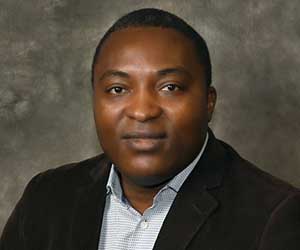Accounting professor’s research puts CEO salaries in sharp focus

Paul Tanyi, associate professor in UNC Charlotte’s Turner School of Accountancy, says excessive executive compensation has been a concern to regulators in the United States for some time.
One of the provisions of the Dodd-Frank Act, passed in 2010 in the aftermath of the Great Recession, requires U.S. companies to disclose total CEO compensation and median employee pay. Disclosures made by companies show “most CEOs make more in one day than employees make in one year,” Tanyi said.
“I am really interested in understanding the role of external auditing and corporate governance in driving the quality of corporate financial reporting, and what elements of external auditing and corporate governance are consequential,” said Tanyi, whose academic journey started in the Central African nation of Cameroon.
Knowing no one, Tanyi moved to the United States in 2004 to pursue a Master of Business Administration, attending Illinois State University. He ingrained himself into the program and excelled.
After earning an MBA, Tanyi decided to further his education and earn a Master of Accountancy.
“I worked in public accounting for a year and realized that I actually prefer teaching accounting better than practicing accounting,” said Tanyi. He pursued a Ph.D. in Business Administration focused on accounting from Florida International University.
His research is primarily in auditing and corporate governance and in the financial reporting process and has appeared in top-tier accounting journals, including Auditing: A Journal of Practice and Theory, Accounting Horizons, Journal of Accounting and Public Policy, Review of Qualitative Finance and Accounting and International Journal of Auditing.
Since joining UNC Charlotte six years ago, he has published more than 14 research papers and has presented his research at a number of national and international conferences. He has served as an ad hoc reviewer for The Accounting Review, Review of Accounting Studies and Auditing: A Journal of Practice and Theory.
“This is a remarkable academic accomplishment,” said Al Ghosh, interim chair of the Turner School and Distinguished Professor of Accounting. “Paul’s research sheds valuable insights into the interactive effects of external auditing and corporate governance on corporate financial reporting quality. His research garners keen interest from practitioners, academics and regulators.”
Tanyi noted UNC Charlotte has funded the data cost of his research, which is significant. “Not all schools do that.”
The Turner School of Accountancy’s reputation and Charlotte’s location are key for attracting top accounting students.
“They (students) see our passion and that professors in this department love teaching and care very much about students,” he said. “Additionally, most of the big and medium-size accounting firms and banks are here, allowing students to have top-tier internships where they live and not have to travel to other parts of the country.”
Research and public policy
Can research studies change public policy? Tanyi cited the case of Enron, and how evidence from prior auditing and corporate governance research conducted in the late ‘90s and early 2000s was used in testimonies made by experts to Congress in shaping the Sarbanes-Oxley Act.
“Everything revolves around accounting in the business world,” said Tanyi, making the point that the school’s degree program is essential and critical to the business environment of Charlotte and the region. He pointed out the presence of Bank of America, Duke Energy and other companies as critical to the region and to his research.